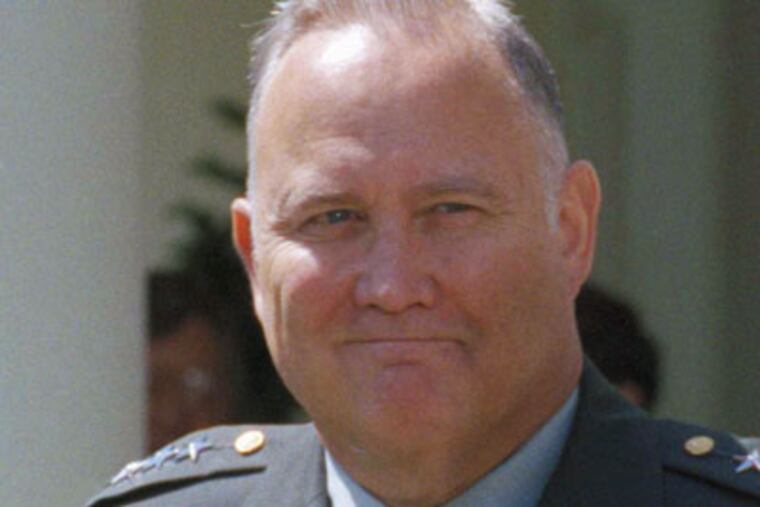General who led Gulf War coalition
H. Norman Schwarzkopf, 78, was a much-decorated soldier who demurred from a political career.

WASHINGTON - Retired Gen. H. Norman Schwarzkopf, 78, who topped an illustrious military career by commanding the U.S.-led international coalition that drove Saddam Hussein's forces out of Kuwait in 1991 but kept a low public profile in controversies over the second Gulf War against Iraq, died Thursday.
Gen. Schwarzkopf died in Tampa, Fla., where he had lived in retirement, according to a U.S. official who spoke on condition of anonymity.
A much-decorated combat soldier in Vietnam, Gen. Schwarzkopf was known popularly as "Stormin' Norman" for a notoriously explosive temper.
He served in his last military assignment in Tampa as commander-in-chief of U.S. Central Command, the headquarters responsible for U.S. military and security concerns from the eastern Mediterranean and Africa to Pakistan.
Schwarzkopf became "CINC-Centcom" in 1988 and when Saddam Hussein invaded Kuwait three years later, he commanded Operation Desert Storm, the coalition organized by President George H.W. Bush that succeeded in driving the Iraqis out.
At the peak of his postwar national celebrity, Gen. Schwarz–kopf - a self-proclaimed political independent - rejected suggestions that he run for office, although he did serve briefly as a military commentator for NBC.
While focused primarily in his later years on charitable enterprises, he campaigned for President George W. Bush in 2000 but was ambivalent about the 2003 invasion of Iraq, saying he doubted victory would be as easy as the White House and Pentagon predicted.
Gen. Schwarzkopf was born Aug. 24, 1934, in Trenton, where his father, Col. H. Norman Schwarzkopf Jr., founder and commander of the New Jersey State Police, was then leading the investigation of the Lindbergh kidnap case, which ended with the arrest and 1936 execution of Richard Hauptmann for stealing and murdering the famed aviator's infant son.
The elder Schwarzkopf was named Herbert, but when the son was asked what his "H" stood for, he would reply, "H." Although reputed to be short-tempered with aides and subordinates, he was a friendly, talkative and even jovial figure who didn't like "Stormin' Norman" and preferred to be known as "the Bear," a sobriquet given him by troops.
He also was outspoken at times, including when he described Gen. William Westmoreland, the U.S. commander in Vietnam, as "a horse's ass" in an Associated Press interview.
As a teenager Norman accompanied his father to Iran, where the elder Schwarzkopf trained the country's national police.
Young Norman followed in his father's footsteps to the U.S. Military Academy, graduating in 1956 with an engineering degree. He earned a master's degree in engineering at the University of Southern California and later taught missile engineering at West Point.
In 1966 he volunteered for Vietnam and served two tours, first as a U.S. adviser to South Vietnamese paratroops and later as a battalion commander in the U.S. Army's Americal Division. He earned three Silver Stars for valor - including one for saving troops from a minefield - plus a Bronze Star, a Purple Heart and three Distinguished Service Medals.
After retiring from the Army in 1992, Gen. Schwarzkopf wrote a best-selling autobiography, It Doesn't Take A Hero.
He and his wife, Brenda, had three children: Cynthia, Jessica, and Christian.